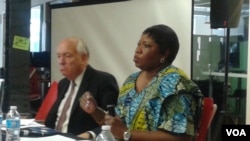More than 30 African nations have ratified the Rome Statute, the treaty that established the Hague-based International Criminal Court.
However, the court, which has 122 members worldwide, has come under heavy criticism from African leaders, who have accused it of carrying out a witch hunt against them.
To date, all the court’s eight cases, are from Africa, and include indictments against Sudan’s President Omar Al Bashir for atrocities in Darfur, Kenyan President Uhuru Kenyatta and his deputy, William Ruto, for the 2007 post-election violence.
Deceased former Libyan leader, Muamar Gadhaffi, was also indicted for atrocities in his country following the protests that led to his ouster, but that was removed following his death.
Despite calls for President Kenyatta and Deputy President William Ruto to ignore the ICC’s indictment, both have appeared before the court, to defend themselves against charges that they were among those complicit in the December post-election violence which resulted in the death of more than 1,000 Kenyans and displacement of thousands.
The ICC has refused calls by the AU for Mr. Kenyatta and Mr. Ruto to stand trial in Kenya, rather than the Hague. In an interview with VOA’s Zimbabwe Service, ICC chief prosecutor Fatou Bensouda, defended the ICC’s involvement in Kenya.
There was a strong urge, by Kenya itself, as a government, to take on the responsibility to investigate and prosecute. There was a commission of inquiry that found that these crimes had been committed and settled to investigate the crimes. It failed.”
Bensouda also refuted accusations labelled against her predecessor, Luis Moreno Ocampo, that indictments against President Kenyatta, Vice President Ruto and others, were baseless. Many referred to the trial delays caused in part by allegations of witness tampering and withdrawals. But Bensouda says the cases were well vetted, and confirmed by independent ICC judges.
“At the confirmation of charges, what you have to prove before the judges is that you have substantial grounds to believe that t this person has committed these crimes … In this instance, we have to recall those three independent judges, confirmed the charges. What does that mean? That there was the evidence.”
Bensouda, who was in Washington recently for a two-day symposium highlighting the ongoing atrocities in Darfur, in Western Sudan, for which President Bashir was indicted, said Mr. Bashir has avoided arrest, in part due to lack of cooperation by African leaders.
She applauded the Darfur Women's Action Group and others involved in the symposium, Women and Genocide in the 21st Century: The Case of Darfur, for keeping Darfur in the spotlight, despite the shift in interest.
“Unfortunately, there’s this lack of political will,” Bensouda said.
Bashir, who was indicted through a UN Security Council resolution, first in 2009 and later in 2010 for war crimes, crimes against humanity and genocide in Darfur, has continued to travel to around the continent.
Bensouda said non-ICC member countries like Zimbabwe, which have hosted Mr. Bashir, despite the arrest warrant, still have an obligation to assist the ICC reign in indicted individuals.
“State parties, when they sign and ratify the Rome Statute, what they are effectively saying is that they will execute the decision of the court. In fact, this is an obligation as a result of ratification. Zimbabwe is not a state party, even though in this instance, I mentioned that [Sudan] is a referral from the UN Security Council, and I believe that all states have the obligation to support the ICC with regards this particular investigation.”
Bensouda said she is confident Bashir will be brought before the court, one day, as will all other war criminals identified by the court. Contrary to believe that the ICC targets only Africa, Bensouda says she’s pursuing investigations in Iraq over the UK forces for their conduct during the 2003 conflict that led to the removal of then leader Saddam Hussein, Georgia, Afghanistan, Columbia and Ukraine.
“This also shows you, whether it is in Africa, or whether it is outside of Africa, if the parameters of my intervention is legally met, within the Rome Statute framework, I will intervene.”





